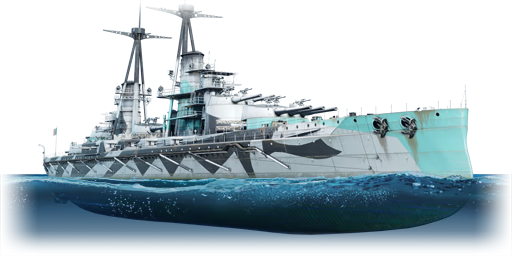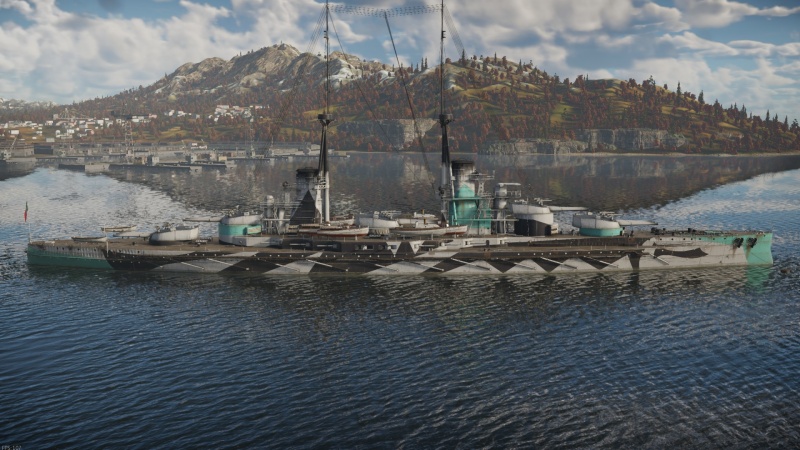Difference between revisions of "RN Leonardo da Vinci"
Jareel_Skaj (talk | contribs) (→Description: New Description Project) |
(→Description) |
||
| Line 6: | Line 6: | ||
== Description == | == Description == | ||
<!-- ''In the first part of the description, cover the history of the ship's creation and military application. In the second part, tell the reader about using this ship in the game. Add a screenshot: if a beginner player has a hard time remembering vehicles by name, a picture will help them identify the ship in question.'' --> | <!-- ''In the first part of the description, cover the history of the ship's creation and military application. In the second part, tell the reader about using this ship in the game. Add a screenshot: if a beginner player has a hard time remembering vehicles by name, a picture will help them identify the ship in question.'' --> | ||
| − | Battleship Leonardo da Vinci was launched in 1911 and commissioned in 1914. The first two years of her career | + | Battleship Leonardo da Vinci was launched in 1911 and commissioned in 1914. The first two years of her career were spent at harbour, due to fears of Austro-Hungarian torpedo attack. In August 1916, she fell victim to an internal explosion due to spontaneous ignition of the main armament propellant charges. The Regia Marina made a decision to recover the wreck, which turned upside down and sunk in the mud at the bottom of the harbour. Refloating wasn't completed until 1919 and righting the ship took until January 1921. The reconstruction of the wreck was estimated to cost 60 million lira - a sum beyond the capabilities of the post-war navy. After numerous attempts to allocate the funding, the Italian Navy finally gave up in 1923 and struck the vessel off the registry, sending the hull to Taranto to be broken up. |
| − | + | Introduced in [[Update "Air Superiority"]], RN Leonardo da Vinci is by far the weakest of the [[Conte di Cavour (Family)|Conte di Cavour-class]] battleships, lacking the armour and armament of the other vessels in the class. The greatest weakness is its stern ammo racks exposed above the waterline. It has overall good armour for its BR and can be used to aggressively push capture points, but it lacks flexibility to retreat without risking deadly hits in the stern. | |
== General info == | == General info == | ||
Revision as of 16:22, 18 February 2024
Contents
Description
Battleship Leonardo da Vinci was launched in 1911 and commissioned in 1914. The first two years of her career were spent at harbour, due to fears of Austro-Hungarian torpedo attack. In August 1916, she fell victim to an internal explosion due to spontaneous ignition of the main armament propellant charges. The Regia Marina made a decision to recover the wreck, which turned upside down and sunk in the mud at the bottom of the harbour. Refloating wasn't completed until 1919 and righting the ship took until January 1921. The reconstruction of the wreck was estimated to cost 60 million lira - a sum beyond the capabilities of the post-war navy. After numerous attempts to allocate the funding, the Italian Navy finally gave up in 1923 and struck the vessel off the registry, sending the hull to Taranto to be broken up.
Introduced in Update "Air Superiority", RN Leonardo da Vinci is by far the weakest of the Conte di Cavour-class battleships, lacking the armour and armament of the other vessels in the class. The greatest weakness is its stern ammo racks exposed above the waterline. It has overall good armour for its BR and can be used to aggressively push capture points, but it lacks flexibility to retreat without risking deadly hits in the stern.
General info
Survivability and armour
Talk about the vehicle's armour. Note the most well-defended and most vulnerable zones, e.g. the ammo magazine. Evaluate the composition of components and assemblies responsible for movement and manoeuvrability. Evaluate the survivability of the primary and secondary armaments separately. Don't forget to mention the size of the crew, which plays an important role in fleet mechanics. Save tips on preserving survivability for the "Usage in battles" section. If necessary, use a graphical template to show the most well-protected or most vulnerable points in the armour.
Mobility
Write about the ship's mobility. Evaluate its power and manoeuvrability, rudder rerouting speed, stopping speed at full tilt, with its maximum forward and reverse speed.
| Mobility Characteristics | |||
|---|---|---|---|
| Game Mode | Upgrade Status | Maximum Speed (km/h) | |
| Forward | Reverse | ||
| AB | |||
| Upgraded | 47 | 29 | |
| RB/SB | |||
| Upgraded | 40 | 25 | |
Modifications and economy
Armament
Primary armament
Provide information about the characteristics of the primary armament. Evaluate their efficacy in battle based on their reload speed, ballistics and the capacity of their shells. Add a link to the main article about the weapon: {{main|Weapon name (calibre)}}. Broadly describe the ammunition available for the primary armament, and provide recommendations on how to use it and which ammunition to choose.
| Penetration statistics | |||||||
|---|---|---|---|---|---|---|---|
| Ammunition | Type of warhead |
Penetration @ 0° Angle of Attack (mm) | |||||
| 1,000 m | 2,500 m | 5,000 m | 7,500 m | 10,000 m | 15,000 m | ||
| 305 mm SAP | SAP | 418 | 375 | 314 | 264 | 224 | 172 |
| 305 mm APCBC | APCBC | 673 | 611 | 521 | 447 | 387 | 303 |
| Shell details | ||||||||||||
|---|---|---|---|---|---|---|---|---|---|---|---|---|
| Ammunition | Type of warhead |
Velocity (m/s) |
Projectile mass (kg) |
Fuse delay (s) |
Fuse sensitivity (mm) |
Explosive mass (TNT equivalent) (kg) |
Ricochet | |||||
| 0% | 50% | 100% | ||||||||||
| 305 mm SAP | SAP | 861 | 401.2 | 0.03 | 17 | 31 | 47° | 60° | 65° | |||
| 305 mm APCBC | APCBC | 861 | 452.37 | 0.035 | 17 | 5.66 | 48° | 63° | 71° | |||
Secondary armament
Some ships are fitted with weapons of various calibres. Secondary armaments are defined as weapons chosen with the control Select secondary weapon. Evaluate the secondary armaments and give advice on how to use them. Describe the ammunition available for the secondary armament. Provide recommendations on how to use them and which ammunition to choose. Remember that any anti-air armament, even heavy calibre weapons, belong in the next section. If there is no secondary armament, remove this section.
| Penetration statistics | |||||||
|---|---|---|---|---|---|---|---|
| Ammunition | Type of warhead |
Penetration @ 0° Angle of Attack (mm) | |||||
| 1,000 m | 2,500 m | 5,000 m | 7,500 m | 10,000 m | 15,000 m | ||
| 120 mm SAP | SAP | 121 | 93 | 61 | 42 | 31 | 27 |
| Shell details | ||||||||||||
|---|---|---|---|---|---|---|---|---|---|---|---|---|
| Ammunition | Type of warhead |
Velocity (m/s) |
Projectile mass (kg) |
Fuse delay (s) |
Fuse sensitivity (mm) |
Explosive mass (TNT equivalent) (kg) |
Ricochet | |||||
| 0% | 50% | 100% | ||||||||||
| 120 mm SAP | SAP | 850 | 22.13 | 0.025 | 6 | 2.2 | 47° | 60° | 65° | |||
Anti-aircraft armament
An important part of the ship's armament responsible for air defence. Anti-aircraft armament is defined by the weapon chosen with the control Select anti-aircraft weapons. Talk about the ship's anti-air cannons and machine guns, the number of guns and their positions, their effective range, and about their overall effectiveness – including against surface targets. If there are no anti-aircraft armaments, remove this section.
Additional armament
Describe the available additional armaments of the ship: depth charges, mines, torpedoes. Talk about their positions, available ammunition and launch features such as dead zones of torpedoes. If there is no additional armament, remove this section.
Usage in battles
Describe the technique of using this ship, the characteristics of her use in a team and tips on strategy. Abstain from writing an entire guide – don't try to provide a single point of view, but give the reader food for thought. Talk about the most dangerous opponents for this vehicle and provide recommendations on fighting them. If necessary, note the specifics of playing with this vehicle in various modes (AB, RB, SB).
Pros and cons
Summarise and briefly evaluate the vehicle in terms of its characteristics and combat effectiveness. Mark its pros and cons in the bulleted list. Try not to use more than 6 points for each of the characteristics. Avoid using categorical definitions such as "bad", "good" and the like - use substitutions with softer forms such as "inadequate" and "effective".
Pros:
Cons:
History
Describe the history of the creation and combat usage of the ship in more detail than in the introduction. If the historical reference turns out to be too long, take it to a separate article, taking a link to the article about the ship and adding a block "/History" (example: https://wiki.warthunder.com/(Ship-name)/History) and add a link to it here using the main template. Be sure to reference text and sources by using <ref></ref>, as well as adding them at the end of the article with <references />. This section may also include the ship's dev blog entry (if applicable) and the in-game encyclopedia description (under === In-game description ===, also if applicable).
Media
Excellent additions to the article would be video guides, screenshots from the game, and photos.
See also
Links to articles on the War Thunder Wiki that you think will be useful for the reader, for example:
- reference to the series of the ship;
- links to approximate analogues of other nations and research trees.
External links
- [Devblog] Premium Battleships Courbet and Leonardo da Vinci
- [Wikipedia] Italian battleship Leonardo da Vinci
- Italian Battleships Conte Di Cavour and Duilio Classes 1911-1956 by Erminio Bagnasco & Augusto de Toro
| Odero-Terni-Orlando Company | |
|---|---|
| Destroyers | |
| Turbine-class | RN Turbine · RN Aquilone |
| Dardo-class | RN Dardo |
| Soldati-class | RN Corazziere · RN Aviere · RN Geniere |
| Comandanti Medaglie d'Oro-class | RN Comandante Margottini |
| Light Cruisers | |
| Condottieri-class | Kerch* · RN Duca degli Abruzzi |
| Capitani Romani-class | RN Attilio Regolo · Guichen** |
| Heavy Cruisers | |
| Trento-class | RN Trento |
| Zara-class | RN Zara · RN Pola |
| Battleships | |
| Conte di Cavour-class | RN Leonardo da Vinci*** |
| Export | Tashkent**** |
| See Also | OTO Melara |
| *RN Duca d'Aosta before war reparation to the USSR | |
| **RN Scipione Africano before war reparation to France | |
| ***Previously ‘’Cantieri navali Odero’’ in Genoa-Sestri Ponente | |
| ****Built for the USSR | |
| Italy battleships | |
|---|---|
| RN Dante Alighieri* | |
| Conte di Cavour-class | RN Conte di Cavour · RN Leonardo da Vinci |
| Duilio-class | RN Duilio · RN Andrea Doria |
| Francesco Caracciolo-class | RN Francesco Caracciolo |
| * = Unique ship | |
| Italy premium ships | |
|---|---|
| Motor torpedo boats | Freccia P-493 · MAS 569 · MS 444 · MC 485 |
| Motor gun boats | Sparviero |
| Sub-chasers | Folaga |
| Destroyers | RN Aquilone · RN Aviere · RN Geniere · RN Tigre · Geniere |
| Heavy cruisers | RN Pola |
| Battleships | RN Leonardo da Vinci |





